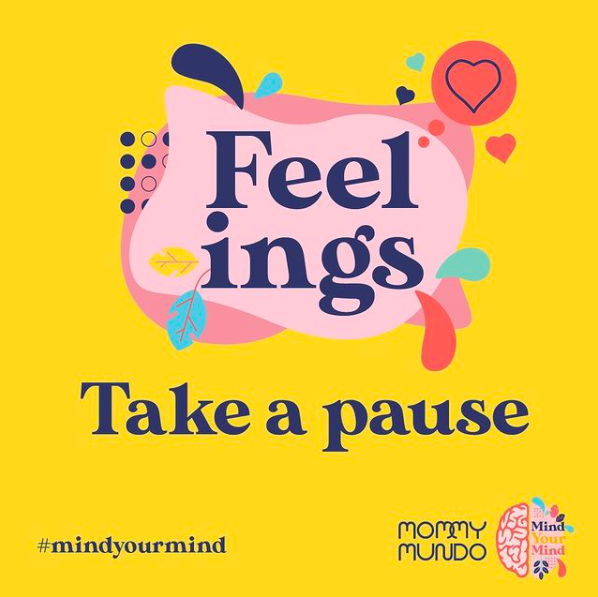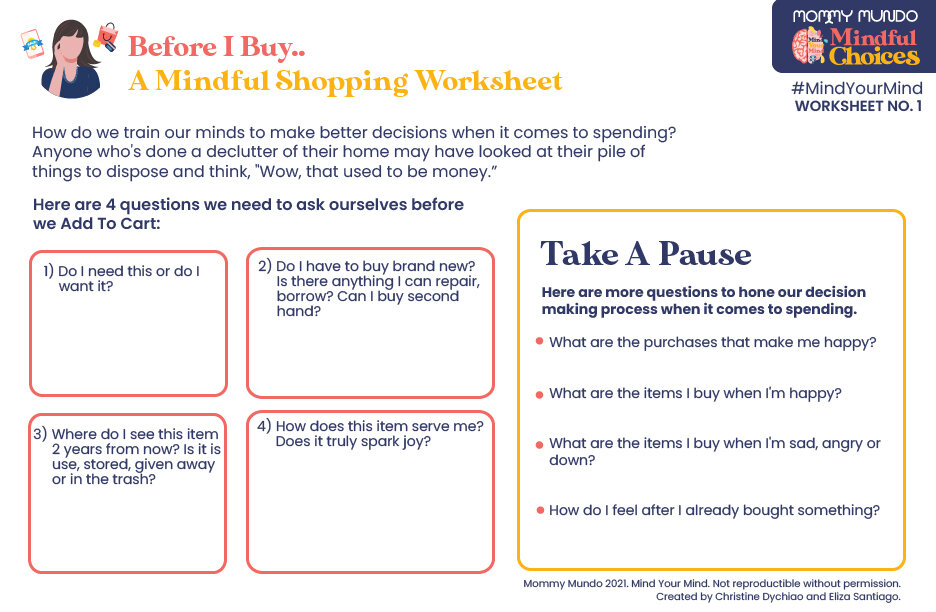Life in this modern world tends to be busy and hectic. More so for moms! That is why being mindful can be incredibly essential. Mommy Mundo’s year-long campaign, Mind Your Mind, helps us slow down by asking us to pause, which gives us a chance to reflect and process everything that is going on in our lives. This month, we are looking at shopping, consumption, and the feelings that influence our consumption habits and decisions. It follows the Mind Your Mind’s theme this second quarter of 2021: Feelings.
There is a natural tendency to connect the idea of feelings to one’s heart, but the reality is that these feelings are born in our minds! When we recognise and realise that it is our brains that regulate our emotions, we can actually be mindful of our feelings and how they may prompt us to respond to certain situations–i.e. Shopping and consumption!
Moms (and anyone really!) can benefit from being mindful in the area of consumption. As moms, we tend to consume a lot! It often creeps up on us without our knowing it. Usually, we moms are tasked with ensuring the home has all of its supplies; ensuring the children have new clothes and shoes, the right school books, toys they will enjoy; and there are our little luxuries too. Before we know it, our homes are cluttered and our brains are cluttered too.
So what can we moms do to be mindful of our feelings and practice mindful consumption? Here are some tips:
1. Wants vs Needs
One of the easiest ways to practice mindful consumption is to always ask yourself: Do I want it or do I need it? Pausing to answer this question really helps curb consumption when one actively chooses to only buy what one needs. Even if you end up buying a want, the process of discerning that went into it prior to the purchase, can help minimise spending and its purpose in your life.
2. Hand Me Downs & Go Arounds
Not all children need new clothes, especially if they have older siblings and older cousins that can give or lend them things to wear. The same goes for books and toys! Teaching children to care for their things so that another child (maybe their sibling or their baby cousin) can use it is a good way to introduce them to being mindful.
3. Rotate Wardrobes
On a personal level, one can practice mindful consumption by pausing to take a look at the things you own and going through Marie Kondo’s ever famous process of sparking joy. A good way to do this is to rotate your wardrobe so that you wear everything at least once and then decide if it indeed sparks joy. To make this quick: as a general rule of thumb, if you don’t wear or use something for at least six months, the likelihood of you using it is very small. In which case, it may be better off being given or sold.
4. Garage Sales & Online Sales
Identifying the clutter in your home doesn’t mean you have to feel guilt for throwing it all out. You can take all that clutter, which likely still has worth, and sell it in a physical garage sale or in an online store. More and more, people are interested and are warmed up to the idea of pre-loved items, especially when they’re well cared for. So make money out of your clutter and feel better for having decompressed your home! This is a mindful practice because you aren’t designating items that still have good value and worth to being a waste. And recycling always benefits the earth.
5. Planning the Groceries
One of the biggest sources of clutter and waste in a home comes with the weekly grocery list. By taking the time to be mindful, planning a menu, and writing down the ingredients you need then encouraging yourself to only buy what you need, you can not only consume mindfully, but also save a lot of money! During the first two rounds, have a look at what is available in your own home, and incorporate those existing items into the menu first. That way you don’t end up with cans bought years ago!
Mindful consumption is a practice and a process. Know that you won’t be able to get it right in a week, or a month. It’s a constant reminding of oneself, a constant practice of pausing, processing, and being present, a frequent awareness of one’s self and habits and the choices to change what we feel needs adjusting. Forgetting is normal and isn’t a crime. It will happen. What’s most important is that we keep practicing until it becomes a habit.
Alongside Christine Dychiao, we’ve put together a free worksheet for you to download to help you take a pause and practice mindful consumption this May!
Learn more about mindful consumption choices when you attend ExpoMom 2021: Mindful Choices! On May 29 – 30, 2021, the two day, free, online event features an impressive roster of speakers, including Christine Dychiao, first Filipina Konmari consultant in the Philippines and advocate of conscious consumption.





Leave a Reply